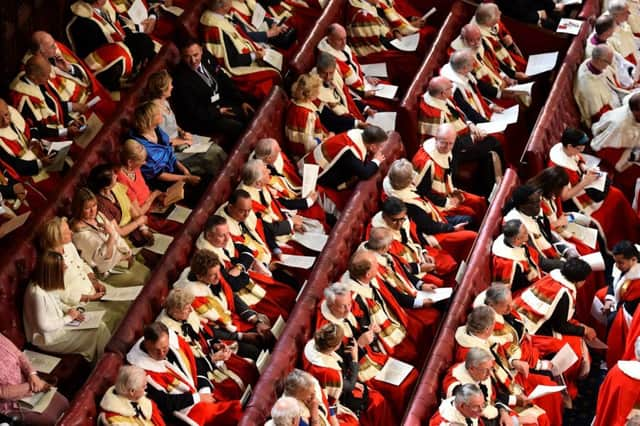Darren Hughes: Time outdated House of Lords moved on


WHAT seems like an annual tradition of looking on in horror at the House of Lords is with us. Our unelected chamber is back in the news – along with its members: Church of England bishops, 90-odd hereditaries, ex-party hacks, and hundreds more with the right political connections.
Yes, the Lords really has become an indefensible outfit and the case for change is compelling. But how bold should change be? With the Lords in the headlines, along come suggestions for reform – some interesting, some too cautious to make a difference.
Advertisement
Hide AdAdvertisement
Hide AdOne of the first to sound the reform call was Lord Bew, who called for all over-75s to be stripped of their £300-a-day allowance in the Lords. Sadly though, it somewhat misses the point. The problems of the Lords aren’t all an issue of age (although with an average age of 70, it’s highly unrepresentative) – an arbitrary end to allowances for one age group isn’t going to do much for accountability.
We do need to end the practice of peers claiming thousands and doing nothing. But we should do that through the ballot box.
Then came Lord Soley’s call for lords to be immediately evicted from office if a negative story appears in the press about them. It’s arguably an arbitrary and even less democratic process than the one at present – and could lead to all sorts of politically-motivated kangaroo courts.
Outside the cosy London club that is the Palace of Westminster though, Kezia Dugdale MSP had a positive proposal: to have a fully-elected second chamber based in Glasgow.
It’s an idea worth considering, not just because the buildings around Big Ben are falling apart (while taxpayers face a huge bill to fix them up), but rather because the flow of power is running from the banks of the Thames. Further devolution to nations and cities of the UK is under way and feels – rightly – irreversible.
While the exact location is up for debate, what’s important is that we actually achieve reform. Because if one thing is clear, it’s that Britain’s upper chamber is thoroughly bust.
The figures speak for themselves: there are nearly 800 voting members of our unelected second House. They can claim £300 a day tax-free just for turning up. Our bloated “other” legislature costs us nearly £100 million a year, averaging out at nearly £120,000 per peer. There are dozens who frequently turn up, claim “their” money, and don’t vote.
Of course, it’s not all about the cash – the fact is, the people who vote on our laws should be accountable to the people they affect. We have the second largest legislature in the world (after China) and the only one in Europe that’s fully unelected. Most of the public think that our legislators should be chosen by, well, the public themselves, instead of parties handing seats over to big donors and ex-politicians.
Advertisement
Hide AdAdvertisement
Hide AdHundreds of peers were added over the course of the last parliament – and now David Cameron is talking about adding hundreds more to gain a Tory majority in both Houses. It’s a move that has led the SNP to call for opposition parties to refrain from nominating anyone for appointments. But this could just make it easier for David Cameron to pack the upper chamber.
It can’t be right that a political party that 63 per cent of UK citizens voted against can have control of both the Commons and the Lords. What happens to democratic scrutiny when the government runs its own “revising” chamber? What we need is real reform.
To achieve this, we need a UK-wide conversation about what kind of elected chamber we want, including where it should be.
A “constitutional convention” of citizens, like that which led to the establishment of the Scottish Parliament, would be a great start. Then we start the process of repairing the reputation of our damaged democracy – and giving citizens a reason to have faith in it.
• Darren Hughes is deputy chief executive of the Electoral Reform Society